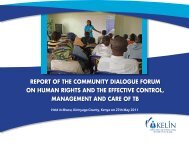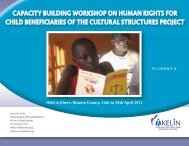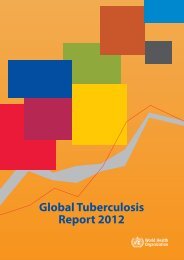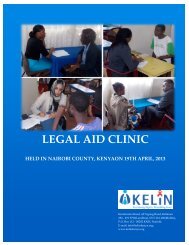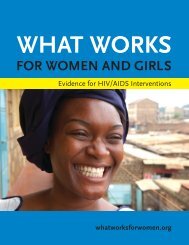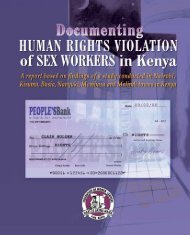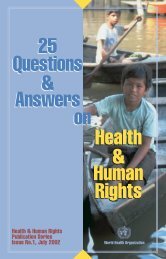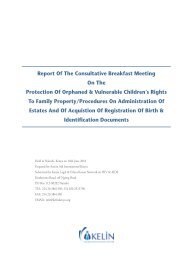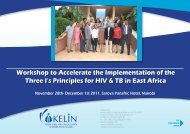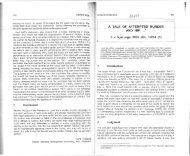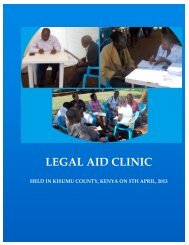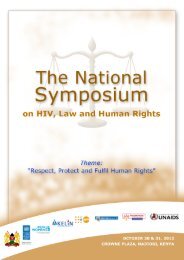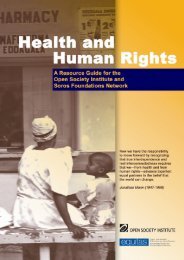REPORT of the KAPSABET TRAINING WORKSHOP on - kelin
REPORT of the KAPSABET TRAINING WORKSHOP on - kelin
REPORT of the KAPSABET TRAINING WORKSHOP on - kelin
You also want an ePaper? Increase the reach of your titles
YUMPU automatically turns print PDFs into web optimized ePapers that Google loves.
<str<strong>on</strong>g>REPORT</str<strong>on</strong>g> <str<strong>on</strong>g>of</str<strong>on</strong>g> <str<strong>on</strong>g>the</str<strong>on</strong>g> <str<strong>on</strong>g>KAPSABET</str<strong>on</strong>g> <str<strong>on</strong>g>TRAINING</str<strong>on</strong>g> <str<strong>on</strong>g>WORKSHOP</str<strong>on</strong>g> <strong>on</strong> COMMUNITY<br />
ENGAGEMENT in <str<strong>on</strong>g>the</str<strong>on</strong>g> CONTROL, MANAGEMENT & CARE <str<strong>on</strong>g>of</str<strong>on</strong>g> TB<br />
PATIENTS INCORPORATING A RIGHTS BASED APPROACH<br />
Held in Kapsabet, Nandi County, Kenya, March 20 th To 22 nd 2011
ABBREVIATIONS<br />
AIDS � � � � � � � � � � � Acquired Immune Deficiency Syndrome<br />
ARV � � � � � � � � � � � Antiretroviral<br />
CBO � � � � � � � � � � � Community Based Organisati<strong>on</strong><br />
CSO � � � � � � � � � � � Civil Society Organisati<strong>on</strong><br />
DTLC� � � � � � � � � � � District TB and Leprosy Coordinator<br />
GoK � � � � � � � � � � � Government <str<strong>on</strong>g>of</str<strong>on</strong>g> Kenya<br />
HIV � � � � � � � � � � � Human Immuno-deficiency Virus<br />
KELIN � � � � � � � � � � Kenya Legal & Ethical Issues Network <strong>on</strong> HIV and AIDS<br />
KNCHR � � � � � � � � � � Kenya Nati<strong>on</strong>al Commissi<strong>on</strong> <strong>on</strong> Human Rights<br />
MDGs � � � � � � � � � � Millennium Development Goals<br />
MoPHS � � � � � � � � � � Ministry <str<strong>on</strong>g>of</str<strong>on</strong>g> Public Health and Sanitati<strong>on</strong><br />
MSM � � � � � � � � � � � Men who have sex with Men<br />
NACC � � � � � � � � � � Nati<strong>on</strong>al AIDS C<strong>on</strong>trol Council<br />
NGO � � � � � � � � � � � N<strong>on</strong>-governmental Organisati<strong>on</strong><br />
PLHIV � � � � � � � � � � Pers<strong>on</strong>s living with HIV<br />
PMTCT � � � � � � � � � � Preventi<strong>on</strong> <str<strong>on</strong>g>of</str<strong>on</strong>g> Mo<str<strong>on</strong>g>the</str<strong>on</strong>g>r to Child Transmissi<strong>on</strong><br />
PPP� � � � � � � � � � � � Public Private Partnership<br />
TB � � � � � � � � � � � � Tuberculosis<br />
UNAIDS� � � � � � � � � � United Nati<strong>on</strong>s Joint Programme <strong>on</strong> HIV<br />
1
CONTENTS<br />
ABBREVIATIONS . . . . . . . . . . . . . . . . . . . . . . . . . . . . . . . . . . . . . . . . . . . . . . . . . 1<br />
1 .0 EXECUTIVE SUMMARY . . . . . . . . . . . . . . . . . . . . . . . . . . . . . . . . . . . . . . . . . . . . . 3<br />
2 .0 SUMMARY OF SESSIONS . . . . . . . . . . . . . . . . . . . . . . . . . . . . . . . . . . . . . . . . . . . . 4<br />
DAY ONE : INTRODUCTION TO BASIC CONCEPTS ON TB, HIV AND ASSOCIATED LEGAL AND ETHICAL ISSUES � � � � � � � � � � � � � � � � � � � � � � � � � � � � � � � � � �4<br />
DAY TWO: LEGAL AND ETHICAL ISSUES RELATED TO TB, HIV AND AIDS� � � � � � � � � � � � � � � � � � � � � � � � � � � � � � � � � � � � � � � � � � � � � � � � � � � � � � � � � �7<br />
DAY THREE: CONTROL OF TB� � � � � � � � � � � � � � � � � � � � � � � � � � � � � � � � � � � � � � � � � � � � � � � � � � � � � � � � � � � � � � � � � � � � � � � � � � � � � � � � � � � �8<br />
3 .0 METHODOLOGY . . . . . . . . . . . . . . . . . . . . . . . . . . . . . . . . . . . . . . . . . . . . . . . 10<br />
APPENDIX I: PROGRAMME . . . . . . . . . . . . . . . . . . . . . . . . . . . . . . . . . . . . . . . . . . . . 11<br />
APPENDIX II: LIST OF PARTICIPANTS . . . . . . . . . . . . . . . . . . . . . . . . . . . . . . . . . . . . . . . . 13<br />
Cover image: Lucy Ghati, TB Programme <str<strong>on</strong>g>of</str<strong>on</strong>g>ficer <str<strong>on</strong>g>of</str<strong>on</strong>g> NEPHAK, during a group discussi<strong>on</strong><br />
2<br />
Prepared by<br />
Kenya Legal & Ethical Issues Network <strong>on</strong> HIV & AIDS<br />
Kindaruma Road, Off Ring Road,<br />
P�O Box 112-002002 NAIROBI<br />
TEL; 254-23861390; 2540202515790<br />
FAX 2540203861390<br />
Email: info@<strong>kelin</strong>kenya�org<br />
Website: www�<strong>kelin</strong>kenya�org<br />
To Top
Report <str<strong>on</strong>g>of</str<strong>on</strong>g> The Training Workshop <strong>on</strong> Community Engagement in The C<strong>on</strong>trol, Management and Care <str<strong>on</strong>g>of</str<strong>on</strong>g> TB Patients<br />
1.0 EXECUTIVE SUMMARY<br />
NAME OF HOSTING<br />
INSTITUTION<br />
KELIN and NEPHAK<br />
COUNTRY/SITE OF MEETING KEBEN CONFERENCE CENTRE, <str<strong>on</strong>g>KAPSABET</str<strong>on</strong>g>, KENYA<br />
MEETING<br />
COMMUNITY ENGAGEMENT IN THE CONTROL,<br />
MANAGEMENT AND CARE OF TB PATIENTS<br />
DATE OF MEETING 20-22ND MARCH 2011<br />
TOTAL NUMBER OF<br />
PARTICIPANTS<br />
MALE<br />
19<br />
The Kenya Legal and Ethical Issues Network <strong>on</strong> HIV& AIDS (KELIN) is <strong>on</strong>e <str<strong>on</strong>g>of</str<strong>on</strong>g> <str<strong>on</strong>g>the</str<strong>on</strong>g> few organisati<strong>on</strong>s in Kenya and East Africa working <strong>on</strong> legal and human rights issues in relati<strong>on</strong> to health and<br />
3<br />
FEMALE<br />
23<br />
HIV� KELIN’s goal is to undertake advocacy and provide leadership in ensuring an enhanced rights based approach in health and HIV strategies and programmes�<br />
The Nati<strong>on</strong>al Empowerment Network <str<strong>on</strong>g>of</str<strong>on</strong>g> People Living with HIV and AIDS in Kenya (NEPHAK) is an NGO that unites support groups <str<strong>on</strong>g>of</str<strong>on</strong>g> People Living with HIV and AIDS<br />
(PLHIV) and individual PLHIV into a nati<strong>on</strong>al and formidable force to counter <str<strong>on</strong>g>the</str<strong>on</strong>g> impact <str<strong>on</strong>g>of</str<strong>on</strong>g> HIV and AIDS <strong>on</strong> <str<strong>on</strong>g>the</str<strong>on</strong>g>ir lives and that <str<strong>on</strong>g>of</str<strong>on</strong>g> <str<strong>on</strong>g>the</str<strong>on</strong>g>ir loved <strong>on</strong>es in Kenya�<br />
When Daniel Ngetich and Patrick Kipngetich; residents <str<strong>on</strong>g>of</str<strong>on</strong>g> Kapsabet were suspected <str<strong>on</strong>g>of</str<strong>on</strong>g> defaulting <strong>on</strong> <str<strong>on</strong>g>the</str<strong>on</strong>g>ir MDR-TB treatment last year, <str<strong>on</strong>g>the</str<strong>on</strong>g>y were arrested and put in jail for<br />
allegedly posing a threat to <str<strong>on</strong>g>the</str<strong>on</strong>g> health <str<strong>on</strong>g>of</str<strong>on</strong>g> <str<strong>on</strong>g>the</str<strong>on</strong>g> Public� Fortunately, <str<strong>on</strong>g>the</str<strong>on</strong>g> two men were released in <str<strong>on</strong>g>the</str<strong>on</strong>g> interim, pending <str<strong>on</strong>g>the</str<strong>on</strong>g> full hearing, after <str<strong>on</strong>g>the</str<strong>on</strong>g> interventi<strong>on</strong> <str<strong>on</strong>g>of</str<strong>on</strong>g> NEPHAK, KELIN and AIDS<br />
Law project, who filed a court case to challenge <str<strong>on</strong>g>the</str<strong>on</strong>g> c<strong>on</strong>stituti<strong>on</strong>ality <str<strong>on</strong>g>of</str<strong>on</strong>g> <str<strong>on</strong>g>the</str<strong>on</strong>g> impris<strong>on</strong>ment� N<strong>on</strong>e<str<strong>on</strong>g>the</str<strong>on</strong>g>less, <str<strong>on</strong>g>the</str<strong>on</strong>g> incarcerati<strong>on</strong> <str<strong>on</strong>g>of</str<strong>on</strong>g> <str<strong>on</strong>g>the</str<strong>on</strong>g> two men sent <str<strong>on</strong>g>the</str<strong>on</strong>g> wr<strong>on</strong>g message and caused<br />
panic am<strong>on</strong>g o<str<strong>on</strong>g>the</str<strong>on</strong>g>r TB patients in <str<strong>on</strong>g>the</str<strong>on</strong>g> area� C<strong>on</strong>sequently, this discouraged <str<strong>on</strong>g>the</str<strong>on</strong>g> number <str<strong>on</strong>g>of</str<strong>on</strong>g> people willing to undergo TB diagnosis and more seriously deterred defaulters <str<strong>on</strong>g>of</str<strong>on</strong>g><br />
normal TB, and even those <strong>on</strong> ARVs, from seeking c<strong>on</strong>tinued treatment�<br />
It is clear that <str<strong>on</strong>g>the</str<strong>on</strong>g> negative social fear caused by misc<strong>on</strong>cepti<strong>on</strong>s surrounding TB issues will require more investment in educati<strong>on</strong> and informati<strong>on</strong> in order to be reversed� To this end, KELIN and<br />
NEPHAK with support <str<strong>on</strong>g>of</str<strong>on</strong>g> <str<strong>on</strong>g>the</str<strong>on</strong>g> Open Society Foundati<strong>on</strong> collaborated to deliver a three day training course in Kapsabet, Kenya, <strong>on</strong> human rights issues related to <str<strong>on</strong>g>the</str<strong>on</strong>g> c<strong>on</strong>trol, management and care<br />
<str<strong>on</strong>g>of</str<strong>on</strong>g> TB, HIV and AIDS� The training was aimed at promoting a human rights approach to TB as a more effective avenue to stop <str<strong>on</strong>g>the</str<strong>on</strong>g> spread <str<strong>on</strong>g>of</str<strong>on</strong>g> TB; where <str<strong>on</strong>g>the</str<strong>on</strong>g> duty bearers and <str<strong>on</strong>g>the</str<strong>on</strong>g> rights holders are<br />
familiar with and appreciate <str<strong>on</strong>g>the</str<strong>on</strong>g>ir rights, resp<strong>on</strong>sibilities and obligati<strong>on</strong>s in <str<strong>on</strong>g>the</str<strong>on</strong>g> c<strong>on</strong>trol, management and care <str<strong>on</strong>g>of</str<strong>on</strong>g> TB�<br />
TOTAL<br />
42<br />
To Top
The training was aimed at streng<str<strong>on</strong>g>the</str<strong>on</strong>g>ning <str<strong>on</strong>g>the</str<strong>on</strong>g> capacity <str<strong>on</strong>g>of</str<strong>on</strong>g> TB patients in <str<strong>on</strong>g>the</str<strong>on</strong>g> community, various representatives <str<strong>on</strong>g>of</str<strong>on</strong>g> government organs resp<strong>on</strong>sible for health, Community Health Workers (CHWs),<br />
area Chiefs, and o<str<strong>on</strong>g>the</str<strong>on</strong>g>r significant figures in <str<strong>on</strong>g>the</str<strong>on</strong>g> community who would be integral to <str<strong>on</strong>g>the</str<strong>on</strong>g> management <str<strong>on</strong>g>of</str<strong>on</strong>g> TB in <str<strong>on</strong>g>the</str<strong>on</strong>g> area�<br />
The three days <str<strong>on</strong>g>of</str<strong>on</strong>g> training was enthusiastically attended by a diverse range <str<strong>on</strong>g>of</str<strong>on</strong>g> people from <str<strong>on</strong>g>the</str<strong>on</strong>g> Kapsabet community; 42 participants in total, 23 female and 19 male� There was intense discussi<strong>on</strong><br />
regarding TB, its causes, effects and treatment� Human rights issues related to HIV and AIDS featured significantly in discussi<strong>on</strong>s around TB, due to <str<strong>on</strong>g>the</str<strong>on</strong>g> very str<strong>on</strong>g correlati<strong>on</strong> between <str<strong>on</strong>g>the</str<strong>on</strong>g> two<br />
health c<strong>on</strong>cerns, and it was agreed that a united fr<strong>on</strong>t is required to address both�<br />
The representatives from <str<strong>on</strong>g>the</str<strong>on</strong>g> various government organs and area chiefs actively engaged in <str<strong>on</strong>g>the</str<strong>on</strong>g> discussi<strong>on</strong>s and c<strong>on</strong>tributed significantly during <str<strong>on</strong>g>the</str<strong>on</strong>g> training, with a view <str<strong>on</strong>g>of</str<strong>on</strong>g> addressing some <str<strong>on</strong>g>of</str<strong>on</strong>g> <str<strong>on</strong>g>the</str<strong>on</strong>g><br />
issues raised in relati<strong>on</strong> to TB in <str<strong>on</strong>g>the</str<strong>on</strong>g> area�<br />
2.0 SUMMARY OF SESSIONS<br />
DAY ONE : INTRODUCTION TO BASIC CONCEPTS ON TB, HIV AND ASSOCIATED LEGAL AND ETHICAL ISSUES<br />
TB ambassadors, <str<strong>on</strong>g>the</str<strong>on</strong>g> area chief and <str<strong>on</strong>g>the</str<strong>on</strong>g> assistant chief follow <str<strong>on</strong>g>the</str<strong>on</strong>g> presentati<strong>on</strong>s closely<br />
2360: Place where<br />
Anne R<strong>on</strong>o, <str<strong>on</strong>g>the</str<strong>on</strong>g> regi<strong>on</strong>al representative <str<strong>on</strong>g>of</str<strong>on</strong>g> NEPHAK, began <str<strong>on</strong>g>the</str<strong>on</strong>g> meeting and welcomed <str<strong>on</strong>g>the</str<strong>on</strong>g> participants<br />
to <str<strong>on</strong>g>the</str<strong>on</strong>g> training including <str<strong>on</strong>g>the</str<strong>on</strong>g> facilitators from KELIN and NEPHAK�<br />
Day One began with an introducti<strong>on</strong> to <str<strong>on</strong>g>the</str<strong>on</strong>g> training by Allan Maleche <str<strong>on</strong>g>of</str<strong>on</strong>g> KELIN, explaining that <str<strong>on</strong>g>the</str<strong>on</strong>g><br />
initiative was aimed at bringing basic informati<strong>on</strong> to <str<strong>on</strong>g>the</str<strong>on</strong>g> community with <str<strong>on</strong>g>the</str<strong>on</strong>g> hope that <str<strong>on</strong>g>the</str<strong>on</strong>g> participants<br />
trained could relay <str<strong>on</strong>g>the</str<strong>on</strong>g> same informati<strong>on</strong> back to support groups, to <str<strong>on</strong>g>the</str<strong>on</strong>g> administrators, and <str<strong>on</strong>g>the</str<strong>on</strong>g><br />
decisi<strong>on</strong>-makers in and around <str<strong>on</strong>g>the</str<strong>on</strong>g> Kapsabet area�<br />
Lucy Ghati <str<strong>on</strong>g>of</str<strong>on</strong>g> NEPHAK outlined <str<strong>on</strong>g>the</str<strong>on</strong>g> definiti<strong>on</strong> <str<strong>on</strong>g>of</str<strong>on</strong>g> TB, drawing <strong>on</strong> input from <str<strong>on</strong>g>the</str<strong>on</strong>g> participants<br />
regarding <str<strong>on</strong>g>the</str<strong>on</strong>g>ir existing knowledge about <str<strong>on</strong>g>the</str<strong>on</strong>g> disease� She outlined TB’s causes, how it is spread, and<br />
how best to manage <str<strong>on</strong>g>the</str<strong>on</strong>g> disease� The presentati<strong>on</strong> included detailed medical informati<strong>on</strong> <strong>on</strong> signs and<br />
symptoms <str<strong>on</strong>g>of</str<strong>on</strong>g> TB, and about multi-drug resistant TB (MDR TB)� Lucy emphasised <str<strong>on</strong>g>the</str<strong>on</strong>g> need to adhere<br />
to <str<strong>on</strong>g>the</str<strong>on</strong>g> full treatment program for TB despite <str<strong>on</strong>g>the</str<strong>on</strong>g> difficulties resulting from <str<strong>on</strong>g>the</str<strong>on</strong>g> lengthy treatment<br />
durati<strong>on</strong> and possible side effects�<br />
4<br />
To Top
It was interesting to learn <str<strong>on</strong>g>of</str<strong>on</strong>g> <str<strong>on</strong>g>the</str<strong>on</strong>g> promoti<strong>on</strong> <str<strong>on</strong>g>of</str<strong>on</strong>g> public private partnerships as explained by a delegate from <str<strong>on</strong>g>the</str<strong>on</strong>g> Ministry <str<strong>on</strong>g>of</str<strong>on</strong>g> Public Health & Sanitati<strong>on</strong> (MoPHS)� In this partnership <str<strong>on</strong>g>the</str<strong>on</strong>g> government<br />
provides essential medicines that are supposed to be dispensed free <str<strong>on</strong>g>of</str<strong>on</strong>g> charge and supplies <str<strong>on</strong>g>the</str<strong>on</strong>g>m to private hospitals to enable people access <str<strong>on</strong>g>the</str<strong>on</strong>g>m free <str<strong>on</strong>g>of</str<strong>on</strong>g> charge even in private facilities when you<br />
would o<str<strong>on</strong>g>the</str<strong>on</strong>g>rwise be required to pay�<br />
Lucy emphasised <str<strong>on</strong>g>the</str<strong>on</strong>g> need to follow TB treatment diligently and c<strong>on</strong>sistently� Dr� Sammy Rop, <str<strong>on</strong>g>the</str<strong>on</strong>g> DTLC – Nandi County, explained that various c<strong>on</strong>siderati<strong>on</strong> inform <str<strong>on</strong>g>the</str<strong>on</strong>g> dosage; including<br />
nutriti<strong>on</strong>al issues and weight issues� He fur<str<strong>on</strong>g>the</str<strong>on</strong>g>r elaborated <strong>on</strong> <str<strong>on</strong>g>the</str<strong>on</strong>g> procedure <str<strong>on</strong>g>of</str<strong>on</strong>g> defaulter tracing in <str<strong>on</strong>g>the</str<strong>on</strong>g> area� One <str<strong>on</strong>g>of</str<strong>on</strong>g> <str<strong>on</strong>g>the</str<strong>on</strong>g> former TB pris<strong>on</strong>ers reported that because he had defaulted <strong>on</strong> his treatment<br />
he had had to start treatment all over again, and received too many injecti<strong>on</strong>s, which was even harder than adhering to <str<strong>on</strong>g>the</str<strong>on</strong>g> treatment in <str<strong>on</strong>g>the</str<strong>on</strong>g> first place�<br />
Nels<strong>on</strong> Otwoma <str<strong>on</strong>g>of</str<strong>on</strong>g> NEPHAK pointed out that TB in HIV positive patients may differ from those who are negative and may be harder to trace� Nels<strong>on</strong> advised CHWs to encourage <str<strong>on</strong>g>the</str<strong>on</strong>g>m to<br />
go for regular TB check-ups for early diagnosis� He also added that <str<strong>on</strong>g>the</str<strong>on</strong>g>y must be advised to be open about <str<strong>on</strong>g>the</str<strong>on</strong>g>ir status particularly to health service providers because <str<strong>on</strong>g>the</str<strong>on</strong>g> TB medicati<strong>on</strong> may<br />
at times not react well with HIV drugs�<br />
Mr� Ropp again c<strong>on</strong>firmed that Kenya does have drugs to treat extremely drug resistant TB, but explained that <str<strong>on</strong>g>the</str<strong>on</strong>g> same costs <str<strong>on</strong>g>the</str<strong>on</strong>g> government a lot <str<strong>on</strong>g>of</str<strong>on</strong>g> m<strong>on</strong>ey� He explained that <str<strong>on</strong>g>the</str<strong>on</strong>g> government<br />
is supposed to pay for <str<strong>on</strong>g>the</str<strong>on</strong>g> drugs, and patients transport to go to <str<strong>on</strong>g>the</str<strong>on</strong>g> hospital and even provided patients with airtime to communicate any difficulties� He also enlightened participants <strong>on</strong> waivers<br />
Dr Rop points out existingbarriers in TB management in Kapsabet<br />
available for TB patients whom <str<strong>on</strong>g>the</str<strong>on</strong>g> chief certifies are unable to pay for related health services� He<br />
explained that <str<strong>on</strong>g>the</str<strong>on</strong>g>re were two social workers in Kapsabet resp<strong>on</strong>sible for assisting patients secure<br />
<str<strong>on</strong>g>the</str<strong>on</strong>g>se waivers�<br />
Unfortunately, majority <str<strong>on</strong>g>of</str<strong>on</strong>g> <str<strong>on</strong>g>the</str<strong>on</strong>g> participants were unaware <str<strong>on</strong>g>of</str<strong>on</strong>g> this provisi<strong>on</strong> and procedure� The few<br />
who were aware raised c<strong>on</strong>cerns at <str<strong>on</strong>g>the</str<strong>on</strong>g> complexity <str<strong>on</strong>g>of</str<strong>on</strong>g> <str<strong>on</strong>g>the</str<strong>on</strong>g> process <str<strong>on</strong>g>of</str<strong>on</strong>g> securing this waiver� Fur<str<strong>on</strong>g>the</str<strong>on</strong>g>r,<br />
<str<strong>on</strong>g>the</str<strong>on</strong>g>y raised doubt c<strong>on</strong>cerning <str<strong>on</strong>g>the</str<strong>on</strong>g> alleged ‘freeness’ <str<strong>on</strong>g>of</str<strong>on</strong>g> TB related services as evidenced by <str<strong>on</strong>g>the</str<strong>on</strong>g><br />
feedback from NEPHAK membership to <str<strong>on</strong>g>the</str<strong>on</strong>g> c<strong>on</strong>trary�<br />
Willie Kibet, a CHW challenged <str<strong>on</strong>g>the</str<strong>on</strong>g> alleged recogniti<strong>on</strong> <str<strong>on</strong>g>of</str<strong>on</strong>g> <str<strong>on</strong>g>the</str<strong>on</strong>g> referrals by CHWs to health<br />
facilities�<br />
“Every time I refer people <str<strong>on</strong>g>the</str<strong>on</strong>g>y come back and say that <str<strong>on</strong>g>the</str<strong>on</strong>g> people at <str<strong>on</strong>g>the</str<strong>on</strong>g> hospital asked who is he to refer you?<br />
Does he have qualificati<strong>on</strong>s to make a referral?”<br />
The doctor from <str<strong>on</strong>g>the</str<strong>on</strong>g> MoPHS recognized <str<strong>on</strong>g>the</str<strong>on</strong>g> existence <str<strong>on</strong>g>of</str<strong>on</strong>g> <str<strong>on</strong>g>the</str<strong>on</strong>g>se barriers and encouraged <str<strong>on</strong>g>the</str<strong>on</strong>g> CHWs<br />
to report such incidences to <str<strong>on</strong>g>the</str<strong>on</strong>g> Area TB Coordinator�<br />
5<br />
To Top
Following a short break <str<strong>on</strong>g>the</str<strong>on</strong>g> area Dr� Sammy Rop from <str<strong>on</strong>g>the</str<strong>on</strong>g> MoPHS was given an opportunity to present TB statistics in <str<strong>on</strong>g>the</str<strong>on</strong>g> area and pointed out <str<strong>on</strong>g>the</str<strong>on</strong>g> str<strong>on</strong>g correlati<strong>on</strong> with HIV� Lucy <str<strong>on</strong>g>of</str<strong>on</strong>g><br />
NEPHAK <str<strong>on</strong>g>the</str<strong>on</strong>g>n led a discussi<strong>on</strong> <strong>on</strong> vulnerable populati<strong>on</strong>s in relati<strong>on</strong> to TB�<br />
The day was c<strong>on</strong>cluded by splitting <str<strong>on</strong>g>the</str<strong>on</strong>g> participants into groups discussi<strong>on</strong>s to analyse <str<strong>on</strong>g>the</str<strong>on</strong>g> factors that make both men and women vulnerable to HIV�<br />
Group Resp<strong>on</strong>ses<br />
Group One: Vulnerability <str<strong>on</strong>g>of</str<strong>on</strong>g> Women<br />
• Ec<strong>on</strong>omically women are more <str<strong>on</strong>g>of</str<strong>on</strong>g>ten than not ec<strong>on</strong>omically weaker than men and as a way <str<strong>on</strong>g>of</str<strong>on</strong>g> sourcing for income <str<strong>on</strong>g>the</str<strong>on</strong>g>y put <str<strong>on</strong>g>the</str<strong>on</strong>g>mselves at high risk <str<strong>on</strong>g>of</str<strong>on</strong>g> HIV�<br />
• Social issues – during <str<strong>on</strong>g>the</str<strong>on</strong>g> birth process more <str<strong>on</strong>g>of</str<strong>on</strong>g>ten than not midwives come and sometimes <str<strong>on</strong>g>the</str<strong>on</strong>g> midwives are infected and put both mo<str<strong>on</strong>g>the</str<strong>on</strong>g>r and child at risk <str<strong>on</strong>g>of</str<strong>on</strong>g> HIV – home births<br />
without assistance, ei<str<strong>on</strong>g>the</str<strong>on</strong>g>r way <str<strong>on</strong>g>the</str<strong>on</strong>g>re is exposure to HIV�<br />
• The fact that women are caring so that if some<strong>on</strong>e is sick with TB <str<strong>on</strong>g>the</str<strong>on</strong>g> women will go <str<strong>on</strong>g>the</str<strong>on</strong>g>re whereas <str<strong>on</strong>g>the</str<strong>on</strong>g> men may care less�<br />
• Sexual violence against women especially rape which <str<strong>on</strong>g>the</str<strong>on</strong>g>n leads to HIV infecti<strong>on</strong>�<br />
• Low supply <str<strong>on</strong>g>of</str<strong>on</strong>g> female c<strong>on</strong>doms�<br />
Support group members solemnly digest <str<strong>on</strong>g>the</str<strong>on</strong>g> statistics <str<strong>on</strong>g>of</str<strong>on</strong>g> HIV and TV<br />
• Female circumcisi<strong>on</strong> or genital mutilati<strong>on</strong> and <str<strong>on</strong>g>the</str<strong>on</strong>g> use <str<strong>on</strong>g>of</str<strong>on</strong>g> <str<strong>on</strong>g>the</str<strong>on</strong>g> same tool�<br />
• Wife inheritance�<br />
• Polygamy�<br />
• Women may be derailed spiritually not to take <str<strong>on</strong>g>the</str<strong>on</strong>g> proper medicati<strong>on</strong> as <str<strong>on</strong>g>the</str<strong>on</strong>g>y believe <str<strong>on</strong>g>the</str<strong>on</strong>g>y will<br />
be healed spiritually�<br />
• According to our culture it is a taboo to talk about sex and <str<strong>on</strong>g>the</str<strong>on</strong>g>refore also about HIV because<br />
<str<strong>on</strong>g>of</str<strong>on</strong>g> <str<strong>on</strong>g>the</str<strong>on</strong>g> associati<strong>on</strong> with sex�<br />
Group Two: Vulnerability <str<strong>on</strong>g>of</str<strong>on</strong>g> Men<br />
• Men have a d<strong>on</strong>’t care attitude�<br />
• The nature <str<strong>on</strong>g>of</str<strong>on</strong>g> <str<strong>on</strong>g>the</str<strong>on</strong>g>ir duties – working in cement companies, c<strong>on</strong>structi<strong>on</strong> sites, dusty places�<br />
• Poor diet – <str<strong>on</strong>g>the</str<strong>on</strong>g>y have to feed <str<strong>on</strong>g>the</str<strong>on</strong>g>ir wives and children first�<br />
• Stress due to <str<strong>on</strong>g>the</str<strong>on</strong>g> resp<strong>on</strong>sibility <str<strong>on</strong>g>of</str<strong>on</strong>g> <str<strong>on</strong>g>the</str<strong>on</strong>g> family�<br />
6<br />
To Top
• Low rate <str<strong>on</strong>g>of</str<strong>on</strong>g> men who visit health centres unless <str<strong>on</strong>g>the</str<strong>on</strong>g>y are bedridden�<br />
• Men go to bars and discos which are social places�<br />
• Stigma – men stigmatise <str<strong>on</strong>g>the</str<strong>on</strong>g>mselves so people can’t know <str<strong>on</strong>g>the</str<strong>on</strong>g>y are HIV positive<br />
• Cultural values – <str<strong>on</strong>g>the</str<strong>on</strong>g> man is <str<strong>on</strong>g>the</str<strong>on</strong>g> head <str<strong>on</strong>g>of</str<strong>on</strong>g> <str<strong>on</strong>g>the</str<strong>on</strong>g> home so if he discloses his HIV status that devalues him�<br />
• Drinking alcohol and cigarettes exposes <str<strong>on</strong>g>the</str<strong>on</strong>g>m to TB�<br />
• Cleanliness – most <str<strong>on</strong>g>of</str<strong>on</strong>g> <str<strong>on</strong>g>the</str<strong>on</strong>g>m are very dirty�<br />
• Negligence – stopping to use medicine when you feel you are getting better�<br />
• Men having side-spouses�<br />
DAY TWO: LEGAL AND ETHICAL ISSUES RELATED TO TB, HIV AND AIDS<br />
Day Two started with a recap by Nels<strong>on</strong> Otwoma and Anne R<strong>on</strong>o from NEPHAK <str<strong>on</strong>g>of</str<strong>on</strong>g> Day One’s sessi<strong>on</strong>s�<br />
Allan Maleche <str<strong>on</strong>g>of</str<strong>on</strong>g> KELIN proceeded with an overview <str<strong>on</strong>g>of</str<strong>on</strong>g> human rights� The participants discussed <str<strong>on</strong>g>the</str<strong>on</strong>g>ir understanding <str<strong>on</strong>g>of</str<strong>on</strong>g> <str<strong>on</strong>g>the</str<strong>on</strong>g> meaning <str<strong>on</strong>g>of</str<strong>on</strong>g> ‘human rights’, children’s rights, workers’ rights, and<br />
pris<strong>on</strong>ers’ rights before <str<strong>on</strong>g>the</str<strong>on</strong>g> presentati<strong>on</strong>�<br />
Alan and Melba <str<strong>on</strong>g>of</str<strong>on</strong>g> KELIN familiarise <str<strong>on</strong>g>the</str<strong>on</strong>g> participants <strong>on</strong> <str<strong>on</strong>g>the</str<strong>on</strong>g> rigts and<br />
resp<strong>on</strong>sibilities regarding HIV and AIDS<br />
He outlined <str<strong>on</strong>g>the</str<strong>on</strong>g> characteristics <str<strong>on</strong>g>of</str<strong>on</strong>g> human rights and <str<strong>on</strong>g>the</str<strong>on</strong>g> limitati<strong>on</strong>s� The deliberati<strong>on</strong>s in this sessi<strong>on</strong><br />
interrogated <str<strong>on</strong>g>the</str<strong>on</strong>g> middle ground between individual rights and public health� Having agreed that <str<strong>on</strong>g>the</str<strong>on</strong>g><br />
pris<strong>on</strong> envir<strong>on</strong>ment was not ideal for TB patients, <str<strong>on</strong>g>the</str<strong>on</strong>g> participants were c<strong>on</strong>cerned that despite being<br />
a high risk area <str<strong>on</strong>g>the</str<strong>on</strong>g>re was no isolati<strong>on</strong> ward in <str<strong>on</strong>g>the</str<strong>on</strong>g> area hospital� Participants felt it was important for<br />
relevant authorities to understand <str<strong>on</strong>g>the</str<strong>on</strong>g> circumstances surrounding n<strong>on</strong>-adherence before acti<strong>on</strong> was<br />
taken� This would enable appropriate assistance and advice to be <str<strong>on</strong>g>of</str<strong>on</strong>g>fered to encourage completi<strong>on</strong> <str<strong>on</strong>g>of</str<strong>on</strong>g><br />
medicati<strong>on</strong>�<br />
The area Assistant Chief observed that before <str<strong>on</strong>g>the</str<strong>on</strong>g> training she was <str<strong>on</strong>g>of</str<strong>on</strong>g> <str<strong>on</strong>g>the</str<strong>on</strong>g> opini<strong>on</strong> that <str<strong>on</strong>g>the</str<strong>on</strong>g> TB defaulters<br />
ought to be locked away, but her opini<strong>on</strong> has since changed observing that it’s <str<strong>on</strong>g>the</str<strong>on</strong>g> lack <str<strong>on</strong>g>of</str<strong>on</strong>g> knowledge<br />
that leads <str<strong>on</strong>g>the</str<strong>on</strong>g>m to stop taking <str<strong>on</strong>g>the</str<strong>on</strong>g>ir medicine� She observed <str<strong>on</strong>g>the</str<strong>on</strong>g> effectiveness <str<strong>on</strong>g>of</str<strong>on</strong>g> TB ambassadors’<br />
discussi<strong>on</strong>s with patients observing that <str<strong>on</strong>g>the</str<strong>on</strong>g>ir message was more acceptable�<br />
7<br />
To Top
Following a short break, Melba Katindi <str<strong>on</strong>g>of</str<strong>on</strong>g> KELIN led discussi<strong>on</strong>s <strong>on</strong> stigma and discriminati<strong>on</strong> by giving <str<strong>on</strong>g>the</str<strong>on</strong>g> facts <str<strong>on</strong>g>of</str<strong>on</strong>g> <str<strong>on</strong>g>the</str<strong>on</strong>g> case <str<strong>on</strong>g>of</str<strong>on</strong>g> Midwa v� Midwa No� 197/2000 [EALR] EA453 (CAK)<br />
drawing out <str<strong>on</strong>g>the</str<strong>on</strong>g> legal and ethical issues as understood by <str<strong>on</strong>g>the</str<strong>on</strong>g> participants� The participants had a very animated discussi<strong>on</strong> as <str<strong>on</strong>g>the</str<strong>on</strong>g> facts <str<strong>on</strong>g>of</str<strong>on</strong>g> <str<strong>on</strong>g>the</str<strong>on</strong>g> case provoked str<strong>on</strong>g reacti<strong>on</strong>s <str<strong>on</strong>g>of</str<strong>on</strong>g> indignati<strong>on</strong> am<strong>on</strong>gst<br />
many <str<strong>on</strong>g>of</str<strong>on</strong>g> <str<strong>on</strong>g>the</str<strong>on</strong>g> participants who had direct experience <str<strong>on</strong>g>of</str<strong>on</strong>g> similar issues� The case was a useful illustrati<strong>on</strong> <str<strong>on</strong>g>of</str<strong>on</strong>g> <str<strong>on</strong>g>the</str<strong>on</strong>g> way in which public percepti<strong>on</strong> drives stigma� Despite <str<strong>on</strong>g>the</str<strong>on</strong>g> c<strong>on</strong>tinuous informati<strong>on</strong>, <str<strong>on</strong>g>the</str<strong>on</strong>g><br />
participants observed that some negative percepti<strong>on</strong>s still persist� The participants observed that in Kapsabet District Hospital <str<strong>on</strong>g>the</str<strong>on</strong>g>re was still, though un<str<strong>on</strong>g>of</str<strong>on</strong>g>ficially, a ward that is exclusively for HIV<br />
patients� It was comm<strong>on</strong> knowledge within <str<strong>on</strong>g>the</str<strong>on</strong>g> community that patients in this ward are HIV positive, and <str<strong>on</strong>g>the</str<strong>on</strong>g> implicati<strong>on</strong> is that most keep away from <str<strong>on</strong>g>the</str<strong>on</strong>g>ir relatives admitted in this ward for fear<br />
<str<strong>on</strong>g>of</str<strong>on</strong>g> infecti<strong>on</strong>�<br />
N<strong>on</strong>e<str<strong>on</strong>g>the</str<strong>on</strong>g>less, many <str<strong>on</strong>g>of</str<strong>on</strong>g> <str<strong>on</strong>g>the</str<strong>on</strong>g> participants from <str<strong>on</strong>g>the</str<strong>on</strong>g> Kapsabet community strive to `live positively` in <str<strong>on</strong>g>the</str<strong>on</strong>g> hope <str<strong>on</strong>g>of</str<strong>on</strong>g> a better understanding am<strong>on</strong>gst <str<strong>on</strong>g>the</str<strong>on</strong>g> community regarding <str<strong>on</strong>g>the</str<strong>on</strong>g> modes <str<strong>on</strong>g>of</str<strong>on</strong>g><br />
transmissi<strong>on</strong> and <str<strong>on</strong>g>the</str<strong>on</strong>g> rights <str<strong>on</strong>g>of</str<strong>on</strong>g> PLHIV� TB related stigma however is an unaddressed struggle� Melba challenged <str<strong>on</strong>g>the</str<strong>on</strong>g> participants to think about how <str<strong>on</strong>g>the</str<strong>on</strong>g>y as a community could deal with TB<br />
related stigma within <str<strong>on</strong>g>the</str<strong>on</strong>g> community�<br />
After <str<strong>on</strong>g>the</str<strong>on</strong>g> lunch break Allan introduced <str<strong>on</strong>g>the</str<strong>on</strong>g> participants to legal and ethical issues related to TB and HIV interrogating <str<strong>on</strong>g>the</str<strong>on</strong>g> testing procedure in <str<strong>on</strong>g>the</str<strong>on</strong>g> local hospitals� He emphasised <str<strong>on</strong>g>the</str<strong>on</strong>g> need for<br />
informed c<strong>on</strong>sent prior to testing and provoked a heated debate <strong>on</strong> disclosure especially am<strong>on</strong>g discordant couples� The need for proper counselling to persuade <str<strong>on</strong>g>the</str<strong>on</strong>g> infected pers<strong>on</strong> to disclose <str<strong>on</strong>g>the</str<strong>on</strong>g>ir<br />
status to <str<strong>on</strong>g>the</str<strong>on</strong>g>ir partner was emphasized�<br />
During <str<strong>on</strong>g>the</str<strong>on</strong>g> discussi<strong>on</strong> <strong>on</strong> Public health and <str<strong>on</strong>g>the</str<strong>on</strong>g> transmissi<strong>on</strong> <str<strong>on</strong>g>of</str<strong>on</strong>g> TB <str<strong>on</strong>g>the</str<strong>on</strong>g> difficulty in balancing <str<strong>on</strong>g>the</str<strong>on</strong>g> right <str<strong>on</strong>g>of</str<strong>on</strong>g> <str<strong>on</strong>g>the</str<strong>on</strong>g> patient with <str<strong>on</strong>g>the</str<strong>on</strong>g> rights <str<strong>on</strong>g>of</str<strong>on</strong>g> <str<strong>on</strong>g>the</str<strong>on</strong>g> public was discussed� Melba outlined <str<strong>on</strong>g>the</str<strong>on</strong>g> case <str<strong>on</strong>g>of</str<strong>on</strong>g><br />
Airline v� School Board <str<strong>on</strong>g>of</str<strong>on</strong>g> Nassau County 480 U�S� (1987) from <str<strong>on</strong>g>the</str<strong>on</strong>g> U�S� She explained that similarly, KELIN was interested in securing a precedent in Kenya that will clearly outline clear<br />
guidelines for protecti<strong>on</strong> <str<strong>on</strong>g>of</str<strong>on</strong>g> both <str<strong>on</strong>g>the</str<strong>on</strong>g> public and <str<strong>on</strong>g>the</str<strong>on</strong>g> individual rights with regard to TB� Melba c<strong>on</strong>cluded by explaining that legal and ethical issues relating to TB particularly highlighting<br />
related stigma and discriminati<strong>on</strong>�<br />
Melba gave an overview <str<strong>on</strong>g>of</str<strong>on</strong>g> <str<strong>on</strong>g>the</str<strong>on</strong>g> Bill <str<strong>on</strong>g>of</str<strong>on</strong>g> Rights particularly focussing <strong>on</strong> <str<strong>on</strong>g>the</str<strong>on</strong>g> right to health relating it to TB and HIV� She also highlighted <str<strong>on</strong>g>the</str<strong>on</strong>g> interdependence between <str<strong>on</strong>g>the</str<strong>on</strong>g> right to health with many<br />
o<str<strong>on</strong>g>the</str<strong>on</strong>g>r underlying determinants such as nutritious food, clean water, proper housing etc� However she was quick to point out that <str<strong>on</strong>g>the</str<strong>on</strong>g> right to health as o<str<strong>on</strong>g>the</str<strong>on</strong>g>r socio-ec<strong>on</strong>omic right will be realised<br />
progressively over a period <str<strong>on</strong>g>of</str<strong>on</strong>g> time and with subject to availability <str<strong>on</strong>g>of</str<strong>on</strong>g> State resources�<br />
The majority <str<strong>on</strong>g>of</str<strong>on</strong>g> <str<strong>on</strong>g>the</str<strong>on</strong>g> participants were familiar with <str<strong>on</strong>g>the</str<strong>on</strong>g> HIV & AIDS Preventi<strong>on</strong> & C<strong>on</strong>trol Act 2006 (HAPCA)� Melba gave an overview <str<strong>on</strong>g>of</str<strong>on</strong>g> <str<strong>on</strong>g>the</str<strong>on</strong>g> Public Health Act, Chapter 242 <str<strong>on</strong>g>of</str<strong>on</strong>g> <str<strong>on</strong>g>the</str<strong>on</strong>g> Laws<br />
<str<strong>on</strong>g>of</str<strong>on</strong>g> Kenya which provides for isolati<strong>on</strong> <str<strong>on</strong>g>of</str<strong>on</strong>g> pers<strong>on</strong>s exposed to an infecti<strong>on</strong> and penalty for wilful exposure� She highlighted <str<strong>on</strong>g>the</str<strong>on</strong>g> c<strong>on</strong>cepts <str<strong>on</strong>g>of</str<strong>on</strong>g> human rights which prohibit forced treatment, but<br />
explained <str<strong>on</strong>g>the</str<strong>on</strong>g> strict legal circumstances under which isolati<strong>on</strong> was legitimate� The day’s sessi<strong>on</strong> c<strong>on</strong>cluded after an intense questi<strong>on</strong> and answer sessi<strong>on</strong> <strong>on</strong> <str<strong>on</strong>g>the</str<strong>on</strong>g> various legal provisi<strong>on</strong>s�<br />
DAY THREE: CONTROL OF TB<br />
Nels<strong>on</strong> Otuoma <str<strong>on</strong>g>of</str<strong>on</strong>g> NEPHAK began <str<strong>on</strong>g>the</str<strong>on</strong>g> sessi<strong>on</strong> with an overview <str<strong>on</strong>g>of</str<strong>on</strong>g> HIV and AIDS, <str<strong>on</strong>g>the</str<strong>on</strong>g> methods <str<strong>on</strong>g>of</str<strong>on</strong>g> transmissi<strong>on</strong> <str<strong>on</strong>g>of</str<strong>on</strong>g> HIV, and also demystified <str<strong>on</strong>g>the</str<strong>on</strong>g> myths around <str<strong>on</strong>g>the</str<strong>on</strong>g> epidemic� He outlined <str<strong>on</strong>g>the</str<strong>on</strong>g><br />
8<br />
To Top
Mr Otuoma <str<strong>on</strong>g>of</str<strong>on</strong>g> Nephak guides participants in <str<strong>on</strong>g>the</str<strong>on</strong>g> group discussi<strong>on</strong>s<br />
The participants identified <str<strong>on</strong>g>the</str<strong>on</strong>g> way forward as outlined below:<br />
process <str<strong>on</strong>g>of</str<strong>on</strong>g> management <str<strong>on</strong>g>of</str<strong>on</strong>g> TB am<strong>on</strong>g PLHIV� This was followed by an overview <str<strong>on</strong>g>of</str<strong>on</strong>g> TB Vaccines by<br />
Lucy� She explained that primary preventi<strong>on</strong> aims to prevent <str<strong>on</strong>g>the</str<strong>on</strong>g> infecti<strong>on</strong>� Sec<strong>on</strong>dary preventi<strong>on</strong> aims<br />
to block <str<strong>on</strong>g>the</str<strong>on</strong>g> progressi<strong>on</strong> <str<strong>on</strong>g>of</str<strong>on</strong>g> <str<strong>on</strong>g>the</str<strong>on</strong>g> disease�<br />
Lucy <str<strong>on</strong>g>of</str<strong>on</strong>g> NEPHAK divided <str<strong>on</strong>g>the</str<strong>on</strong>g> participants into three groups to discuss three case studies dealing with<br />
issues <str<strong>on</strong>g>of</str<strong>on</strong>g> stigma and discriminati<strong>on</strong>� The purpose <str<strong>on</strong>g>of</str<strong>on</strong>g> <str<strong>on</strong>g>the</str<strong>on</strong>g> exercise was to examine <str<strong>on</strong>g>the</str<strong>on</strong>g> practical applicati<strong>on</strong><br />
<str<strong>on</strong>g>of</str<strong>on</strong>g> what <str<strong>on</strong>g>the</str<strong>on</strong>g> participants had learnt which resulted in lively discussi<strong>on</strong>s by <str<strong>on</strong>g>the</str<strong>on</strong>g> participants� The case<br />
studies were based <strong>on</strong> real life experiences <str<strong>on</strong>g>of</str<strong>on</strong>g> 3 <str<strong>on</strong>g>of</str<strong>on</strong>g> <str<strong>on</strong>g>the</str<strong>on</strong>g> participants for agreed to share <str<strong>on</strong>g>the</str<strong>on</strong>g>ir stories�<br />
The key issues discussed from <str<strong>on</strong>g>the</str<strong>on</strong>g> case studies were discriminati<strong>on</strong>, rights <str<strong>on</strong>g>of</str<strong>on</strong>g> OVCs and <str<strong>on</strong>g>of</str<strong>on</strong>g> People with<br />
disability living with HIV, role <str<strong>on</strong>g>of</str<strong>on</strong>g> health care service providers, use <str<strong>on</strong>g>of</str<strong>on</strong>g> TB support groups to enhanced<br />
adherence to treatment, mandatory testing, accessibility <str<strong>on</strong>g>of</str<strong>on</strong>g> health services and informati<strong>on</strong>, am<strong>on</strong>g<br />
o<str<strong>on</strong>g>the</str<strong>on</strong>g>rs�<br />
POSSIBLE INTERVENTIONS AND SOLUTIONS SUGGESTED BY THE<br />
PARTICIPANTS<br />
1� TB discussi<strong>on</strong>s in Community support groups and chiefs’ barazas were encouraged as a way to sensitize <str<strong>on</strong>g>the</str<strong>on</strong>g> community and prevent reoccurrence <str<strong>on</strong>g>of</str<strong>on</strong>g> TB related arrests� It was suggested<br />
that <str<strong>on</strong>g>the</str<strong>on</strong>g> three TB survivors who were impris<strong>on</strong>ed should be initiated to become TB ambassadors because <str<strong>on</strong>g>the</str<strong>on</strong>g>ir experience would be <str<strong>on</strong>g>of</str<strong>on</strong>g> much value to <str<strong>on</strong>g>the</str<strong>on</strong>g> community and would be useful<br />
in reversing <str<strong>on</strong>g>the</str<strong>on</strong>g> negative effect <str<strong>on</strong>g>of</str<strong>on</strong>g> <str<strong>on</strong>g>the</str<strong>on</strong>g> impris<strong>on</strong>ment�<br />
2� The need for c<strong>on</strong>tinued educati<strong>on</strong> for <str<strong>on</strong>g>the</str<strong>on</strong>g> community regarding <str<strong>on</strong>g>the</str<strong>on</strong>g>ir human and health rights�<br />
3� The support groups resolved to go into <str<strong>on</strong>g>the</str<strong>on</strong>g> communities and identify violati<strong>on</strong>s resulting from TB and HIV related stigma� The informati<strong>on</strong> should be relayed both to <str<strong>on</strong>g>the</str<strong>on</strong>g> chiefs and<br />
assistant chiefs for possible soluti<strong>on</strong>s and to KELIN and/or NEPHAK for follow-up�<br />
4� The support groups should document <str<strong>on</strong>g>the</str<strong>on</strong>g> number <str<strong>on</strong>g>of</str<strong>on</strong>g> orphans in <str<strong>on</strong>g>the</str<strong>on</strong>g> areas and relay this informati<strong>on</strong> to <str<strong>on</strong>g>the</str<strong>on</strong>g> chiefs for fur<str<strong>on</strong>g>the</str<strong>on</strong>g>r assistance in enabling <str<strong>on</strong>g>the</str<strong>on</strong>g>m secure birth certificates from <str<strong>on</strong>g>the</str<strong>on</strong>g><br />
DRO� Anne <strong>on</strong> behalf <str<strong>on</strong>g>of</str<strong>on</strong>g> NEPHAK will assist in filling out <str<strong>on</strong>g>the</str<strong>on</strong>g> forms for birth certificates� KELIN will be assist where necessary�<br />
5� It was resolved that all <str<strong>on</strong>g>the</str<strong>on</strong>g> government representatives be invited to <str<strong>on</strong>g>the</str<strong>on</strong>g> community dialogue forum so that <str<strong>on</strong>g>the</str<strong>on</strong>g>y can be made aware <str<strong>on</strong>g>of</str<strong>on</strong>g> existing community issues�<br />
9<br />
To Top
3.0 METHODOLOGY<br />
The training was c<strong>on</strong>ducted through power point presentati<strong>on</strong>s, and group discussi<strong>on</strong>, including dialogue with representatives <str<strong>on</strong>g>of</str<strong>on</strong>g> government ministries, health pr<str<strong>on</strong>g>of</str<strong>on</strong>g>essi<strong>on</strong>als, and Chiefs from <str<strong>on</strong>g>the</str<strong>on</strong>g><br />
local area� KELIN also undertook to forward <str<strong>on</strong>g>the</str<strong>on</strong>g> outcome <str<strong>on</strong>g>of</str<strong>on</strong>g> <str<strong>on</strong>g>the</str<strong>on</strong>g> training including all recommendati<strong>on</strong>s <strong>on</strong> <str<strong>on</strong>g>the</str<strong>on</strong>g> way forward in <str<strong>on</strong>g>the</str<strong>on</strong>g> form <str<strong>on</strong>g>of</str<strong>on</strong>g> a report� The Power Point presentati<strong>on</strong>s for this training<br />
can be accessed via <str<strong>on</strong>g>the</str<strong>on</strong>g> KELIN website�<br />
10<br />
To Top
APPENDIX I: PROGRAMME<br />
Communitity Engagement In The C<strong>on</strong>trol, Management And Care Of Tb<br />
In Kaben Hotel, Kapsabet <strong>on</strong> 20 th – 22 nd March 2011<br />
Objectives<br />
• Introduce/ clarify basic c<strong>on</strong>cepts <strong>on</strong> TB<br />
• Introduce/clarify basic human rights c<strong>on</strong>cepts<br />
• Understanding <str<strong>on</strong>g>the</str<strong>on</strong>g> link between TB and HIV and vulnerable populati<strong>on</strong>s in light <str<strong>on</strong>g>of</str<strong>on</strong>g> both<br />
• Understand <str<strong>on</strong>g>the</str<strong>on</strong>g> general legal and ethical issues raised by TB and HIV<br />
• Enable an understanding <str<strong>on</strong>g>of</str<strong>on</strong>g> <str<strong>on</strong>g>the</str<strong>on</strong>g> link between Human rights, TB and HIV & AIDS<br />
• Enable an understanding <str<strong>on</strong>g>of</str<strong>on</strong>g> <str<strong>on</strong>g>the</str<strong>on</strong>g> balance between Public health and Human rights in <str<strong>on</strong>g>the</str<strong>on</strong>g> c<strong>on</strong>text <str<strong>on</strong>g>of</str<strong>on</strong>g> TB and HIV<br />
• Enable an understanding <str<strong>on</strong>g>of</str<strong>on</strong>g> <str<strong>on</strong>g>the</str<strong>on</strong>g> legal and policy provisi<strong>on</strong>s in relati<strong>on</strong> to TB management<br />
• Empower <str<strong>on</strong>g>the</str<strong>on</strong>g> community in comprehensive rights based knowledge <strong>on</strong> TB Treatment and o<str<strong>on</strong>g>the</str<strong>on</strong>g>r health rights<br />
• Share <str<strong>on</strong>g>the</str<strong>on</strong>g> roles and resp<strong>on</strong>sibilities <str<strong>on</strong>g>of</str<strong>on</strong>g> <str<strong>on</strong>g>the</str<strong>on</strong>g> communities in <str<strong>on</strong>g>the</str<strong>on</strong>g> resp<strong>on</strong>se to TB<br />
20TH MARCH 2011<br />
TIME SESSION FACILITATIOR<br />
8�00 - 9�00 AM Arrival and Registrati<strong>on</strong><br />
9�00 – 9�30 AM Climate setting: Welcome remarks and Introducti<strong>on</strong>s (name and key<br />
expectati<strong>on</strong>)<br />
NEPHAK<br />
9�30 – 11�00 AM Module 1: Overview <str<strong>on</strong>g>of</str<strong>on</strong>g> TB<br />
(What is TB, Signs and Symptoms, Transmissi<strong>on</strong>, Diagnosis, Treatment,<br />
What is Multi Drug-Resistant TB - MDR)<br />
NEPHAK<br />
11�00 – 11�30<br />
AM<br />
Tea Break<br />
11�30 – 1�30 PM Module 2: Impact <str<strong>on</strong>g>of</str<strong>on</strong>g> TB and HIV<br />
NEPHAK/ Ministry <str<strong>on</strong>g>of</str<strong>on</strong>g> Public<br />
1�30 – 2�30 PM<br />
Health<br />
Global epidemiology <str<strong>on</strong>g>of</str<strong>on</strong>g> TB and HIV (Infecti<strong>on</strong> rates), Kenyan Nati<strong>on</strong>al<br />
and local statistics�<br />
Lunch Break<br />
11<br />
To Top
2�30 – 4�00 PM Module 3: Vulnerable Populati<strong>on</strong>s and At Risk Populati<strong>on</strong>s in relati<strong>on</strong><br />
to TB<br />
General Risk factors<br />
(Gender - Gender and Gender Disparities in TB & TB in Women<br />
especially during pregnancy, Age - children, Poverty, Housing,<br />
C<strong>on</strong>gesti<strong>on</strong>, Transport), C<strong>on</strong>necti<strong>on</strong> between TB and HIV<br />
4�00 – 4�30 PM Tea & Departure<br />
21ST MARCH 2011<br />
8�30 – 9�00 AM RECAP<br />
9�00 – 10�00 AM Module 4: Introducti<strong>on</strong> to Human Rights<br />
(meaning: characteristics: general principles: underlying principles:<br />
Human rights and HIV & Human rights and TB - Relevant<br />
Internati<strong>on</strong>al Instruments)<br />
10�00 – 11�00 Module 5: Stigma & Discriminati<strong>on</strong><br />
AM<br />
(Definiti<strong>on</strong> <str<strong>on</strong>g>of</str<strong>on</strong>g> Stigma, meaning <str<strong>on</strong>g>of</str<strong>on</strong>g> stigma, main causes <str<strong>on</strong>g>of</str<strong>on</strong>g> stigma, effect<br />
<str<strong>on</strong>g>of</str<strong>on</strong>g> stigma <strong>on</strong> TB and HIV programmes)<br />
11�00 – 11�30 Tea Break<br />
AM<br />
11�30 – 1�00 PM Module 6: Legal and Ethical Issues in <str<strong>on</strong>g>the</str<strong>on</strong>g> c<strong>on</strong>text <str<strong>on</strong>g>of</str<strong>on</strong>g> TB and HIV &<br />
AIDS<br />
(Human reacti<strong>on</strong>s to HIV & AIDS, Legal and Ethical Issues relating to<br />
testing, c<strong>on</strong>fidentiality, gender issues, biomedical research, TB in light<br />
<str<strong>on</strong>g>of</str<strong>on</strong>g> HIV, Criminal law in <str<strong>on</strong>g>the</str<strong>on</strong>g> c<strong>on</strong>text <str<strong>on</strong>g>of</str<strong>on</strong>g> TB and HIV,<br />
Public Health vs� Individual liberties (Aut<strong>on</strong>omy)<br />
1�00 – 2�00 PM Lunch Break<br />
2�00 – 3�30 PM Module 7: TB C<strong>on</strong>trol and <str<strong>on</strong>g>the</str<strong>on</strong>g> Law in Kenya<br />
Legal system in Kenya, The Public Health Act,<br />
Relevant Guidelines/Internati<strong>on</strong>al Instruments, Government Policies,<br />
The role <str<strong>on</strong>g>of</str<strong>on</strong>g> <str<strong>on</strong>g>the</str<strong>on</strong>g> court process, Decided cases <strong>on</strong> TB Patients<br />
3�30 – 4�00 PM Tea & Departure<br />
22ND MARCH 2011<br />
9�00 – 9�30 AM RECAP<br />
NEPHAK<br />
KELIN<br />
KELIN<br />
KELIN<br />
KELIN<br />
12<br />
To Top
9�30 – 11�00 AM Module 7: Effective C<strong>on</strong>trol <str<strong>on</strong>g>of</str<strong>on</strong>g> TB<br />
(Diagnosis, Preventi<strong>on</strong>, Management and Treatment, Importance<br />
<str<strong>on</strong>g>of</str<strong>on</strong>g> adherence to treatment, Internati<strong>on</strong>al standards in TB care and<br />
management , best practice community approaches, TB patient Charter,<br />
Role <str<strong>on</strong>g>of</str<strong>on</strong>g> Community in TB Management)<br />
NEPHAK/KELIN<br />
11�00 – 11�30<br />
AM<br />
Tea Break<br />
11�30 – 1�00 PM Module 8: CASES STUDIES<br />
(Group work/discussi<strong>on</strong>, Presentati<strong>on</strong>s)<br />
NEPHAK<br />
1�00 – 2�00 PM Lunch Break<br />
2�00 – 3�00 PM Way Forward and Community acti<strong>on</strong> Planning KELIN & NEPHAK<br />
3�00 – 3�30 PM Awarding <str<strong>on</strong>g>of</str<strong>on</strong>g> Certificates to participati<strong>on</strong> KELIN & NEPHAK<br />
3�30 – 4�00 PM Tea Break & Departure<br />
APPENDIX II: LIST OF PARTICIPANTS<br />
No� Name Sex Organizati<strong>on</strong> Address<br />
1� John C� Mwei M Ass� Chief P�O� Box 30 Kapsabet<br />
2� Joseph Kogo M Chief P�O� Box 10 Kapsabet<br />
3� Anita Achieng F Safina P�O� Box 110 Kapsabet<br />
4� Judith Atieno F CAAMAN PMTCT P�O� Box 5 Kapsabet<br />
5� Norah Singoei F Kapsasur Baraka Support Group P�O� Box 268 Kapsabet<br />
6� Roida Emba F Safina Support Group P�O� Box 1027 Kapsabet<br />
7� Zekia Jeplosgei F Kamobo Widows G� P�O� Box 24 Kapsabet<br />
8� Ann Muhamdia Bomdi F Kamatargul Support Group P�O� Box 40 Kapsabet<br />
9� Ruth Tuwei F UPENDO Support Group P�O� Box 369 Kapsabet<br />
10� Josphat Amoshe M Nandi Empowered People Living positive P�O� Box 268 Kapsabet<br />
11� David Sirtui M St� Francis Ukweli Support Group P�O� Box 369 Kapsabet<br />
12� Violet Chadota F Mwanro Support Group P�O� Box 220 Kapsabet<br />
13� David Sitienei M G�K� Pris<strong>on</strong> Support Group P�O� Box 62 Kapsabet<br />
13<br />
To Top
14� Christine Keino F G�K� Pris<strong>on</strong> Support Group P�O� Box 62 Kapsabet<br />
15� Betty C� Cheruto F Kamatargui Support Group P�O� Box 1005 Kapsabet<br />
16� Wilbroda Otieto F Saffina Support Group P�O� Box 1110 Kapsabet<br />
17� B<strong>on</strong>face Amusavi M NEEMA Support Group P�O� Box 1038 Kapsabet<br />
18� Anne R<strong>on</strong>o F NANDI Empowered RP P�O� Box 488 Kapsabet<br />
19� Lucy Atieno F Olemica CBO P�O� Box 1003 Kapsabet<br />
20� Hellen Jepatoo F Support Group P�O� Box 85 Kapsabet<br />
21� Seli Chepkoech F Disability Group P�O� Box 27 Kapsabet<br />
22� Salina Sang F Support Group<br />
23� Henry Ngetach M TB Survivor P�O� Box 15 Kapsabet<br />
24� Daniel Ngetich M TB Survivor Kiminba<br />
25� Lydia Jemeh Tanui F Kenepote Support Group P�O� Box 122 Kapsabet<br />
26� Silas C Maru M Disability is not inability Support Group marusilas@yahoo�com<br />
27� Elwd N� Munyao M Min� <str<strong>on</strong>g>of</str<strong>on</strong>g> Planning P�O� Box 360 Kapsabet<br />
28� Florence I Mbaya F Kapicangani Group<br />
29� Ernest K Ruto M TB Survivor P�O� Box 15 Kapsabet<br />
30� Willy Kipkemoi Kibet M Muitai Care Support Group P�O� Box 13121 Nandi Hills<br />
31� Christine Sambu F Mutai Care Support Group Nandi Hills<br />
32� Daniel Mgo M TB Survivor<br />
33� Selenah Ngetich F Asst� Chief<br />
34� Samuel K�Bittok M CACC-Coordinator P�O� Box 1123 Kapsabet<br />
35� Sammy Rop M DTLC-Nandi P�O� Box 5 Kapsabet<br />
36� John Mburu M Driver – Kim Tours Eldoret<br />
37� Martin Maruti M Sayare T�V Eldoret<br />
38� Victoria Chepkosgei F Kamobo T Group 321 Kapsabet<br />
39� Linda Tuwei F On behalf <str<strong>on</strong>g>of</str<strong>on</strong>g> CACC Coordinator 85 Kapsabet<br />
40� Patrick Nckirui M TB Survivors<br />
41� Tecla Kimetto F DASCO<br />
42� Willy Kipkemoi Kibet M<br />
Muitai Care and Support Ambassador <str<strong>on</strong>g>of</str<strong>on</strong>g><br />
Hope<br />
14<br />
Kipkemoi�kibet@yahoo�com<br />
To Top




